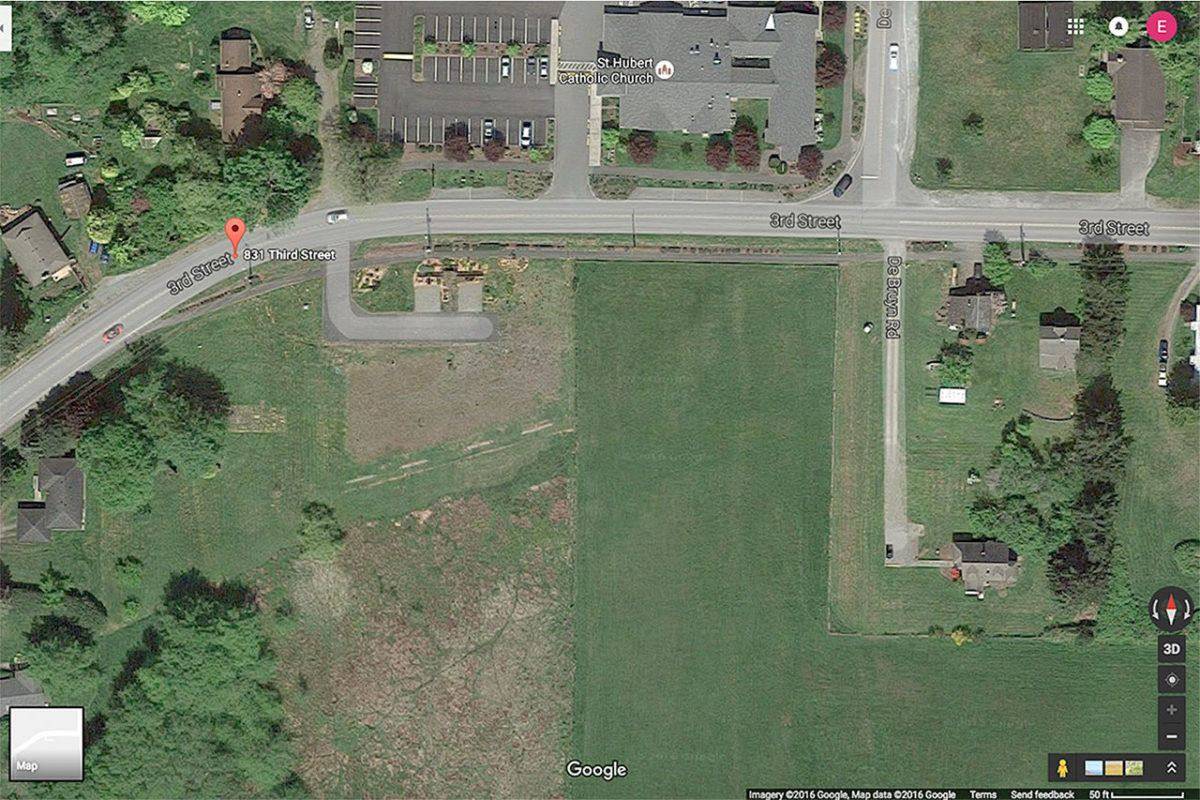Habitat for Humanities’ plans to build a lower-cost homes in Langley may overcome a regulatory obstacle Monday if the city council approves a rezoning ordinance.
The council is scheduled for a second reading of zoning map changes, known as Ordinance 1054. The first reading resulted in a 4-1 vote to pass it.
The ordinance involves rezoning a lot on Third Street at the west entrance to Langley from single-family use to mixed residential.
The property, purchased by Habitat for Humanity of Island County more than two years ago, would allow the nonprofit organization to build attached housing units, such as duplexes, townhouses and apartments.
A conceptual design shows enough room for seven families to live in the two-floor units that would be attached townhouses.
Some neighbors surrounding the property have expressed concerns that the location isn’t suitable for a housing development and that the city is improperly “spot zoning” on behalf of the affordable-housing agency.
Orin Kolaitis, chief executive officer of Island County’s Habitat for Humanity, said the organization took out a loan to purchase the property in October 2016.
“As property values continue to rise we saw this as an opportunity to further our mission for deserving families in South Whidbey,” Kolaitis said. “We currently use proceeds from our furniture stores to make the monthly payments on our loan and will fundraise to help pay it off.”
It consists of two lots. The first property at 831 Third Street is a developed parcel of 0.44 acres with utility hookups and it includes an L-shaped driveway with two parking areas. The other parcel, located on 843 Third Street, is 3.4 acres with the majority being wetlands.
“The conceptual design is based on a multi-family townhouse that Habitat has built in the city of Oak Harbor. It is one footprint with two single-family homes,” Kolaitis said.”
The two-floor homes are side by side with a shared wall. The conceptual design shows three bedrooms, one bath upstairs, kitchen, living, dining room and half bath downstairs. Potential homeowners would go through the Habitat application process that determines eligibility for the affordable home ownership program.
“Habitat’s intention is to use this property for affordable workforce housing with the greatest impact on number of Langley families served,” Kolaitis explained. “If the city council adopts the zone change proposal, Habitat could build seven single family residences.”
Seven three-bedroom homes could house about 35 people, he said.
The city is making affordable housing a priority for several reasons, according to Brigid Reynolds, director of community planning. Among them are an aging population, a school system that is losing students because families can’t find places to live in the district and a lack of housing units for employees of businesses that cater to the tourism economy.
“Since February 2017, the planning advisory board has been working to remove barriers and increase housing options within the city,” she said. “We are very limited in the potential sites for multi-resident units.”
Kolaitis said the opposition expressed in Langley about the affordable housing proposal is an echo he’s heard in other locations.
He said resistance is usually couched in terms such as, “We’re all in favor of affordable housing, but…”
“This is a common reaction to the unknown with having a Habitat house nearby,” Kolaitis said. “The family’s success and the community involvement created during our projects has typically changed the minds of neighbors.”
All Habitat homes require primary residence occupancy so they cannot become rental units. Subleasing, resale, and renting restrictions are set forth in the land lease agreement.
The rezoning change opens the door to individuals and families who can’t afford to live in the city where they work, send their children to school or stay once they’ve retired, he said.
In an interview, Kolaitis responded to some of the opposition he heard from Langley residents at meetings.
“The future homeowners of these homes could already live in your community,” he said.
“There’s a great chance that you know them,” he added. “Again, every neighborhood we’ve built in has said they are all for affordable housing but aren’t on board for this particular plan. If nothing else, those truly in support of affordable housing could support the effort by letting go of their preconceived notion of people in need.”



